Sound of Charlotte Blog
Kenney Potter on Mendelssohn’s Lobgesang
March 1, 2023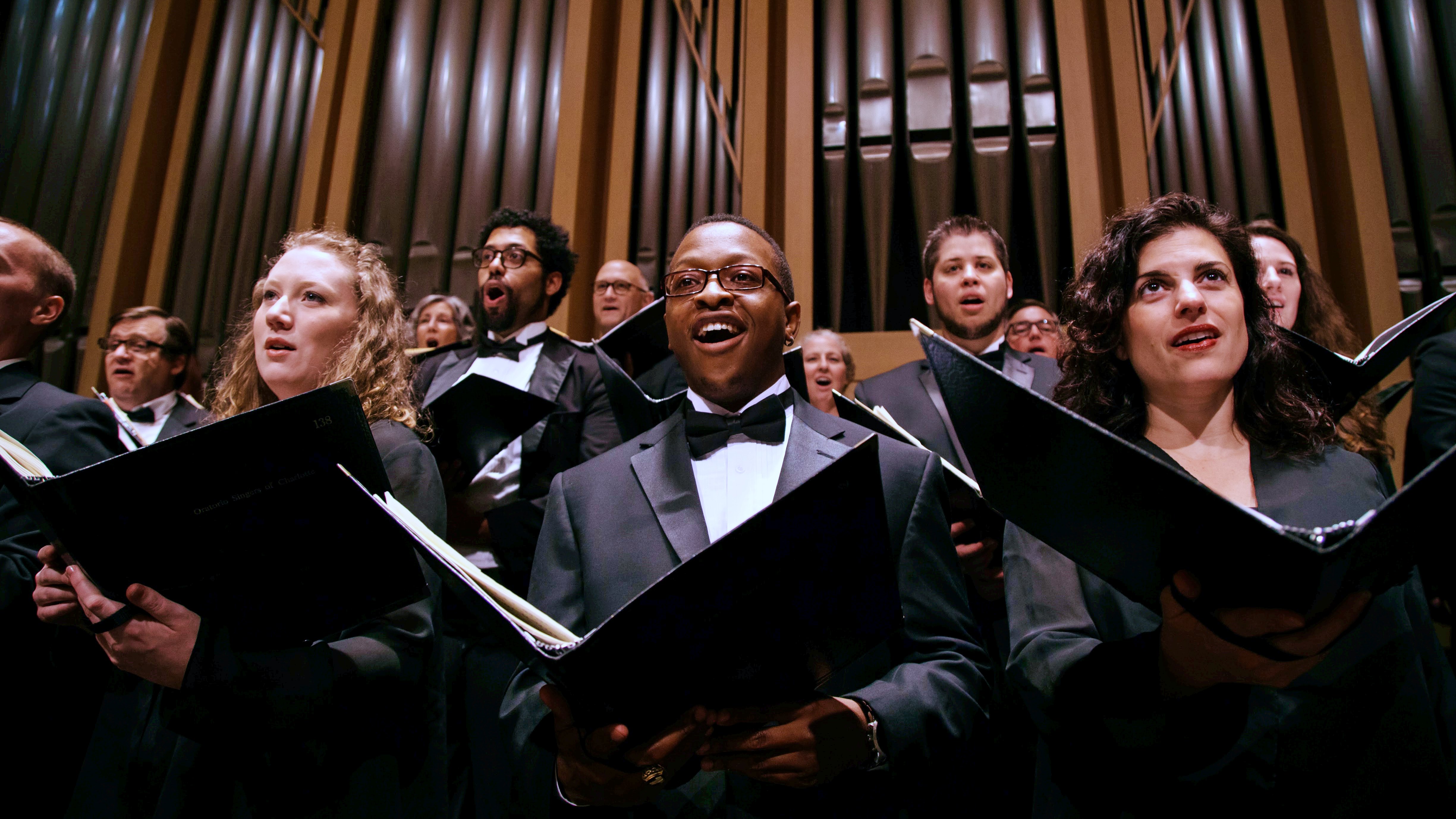
Jessica Cottis returns to the Charlotte Symphony on March 24 & 25 to lead the Orchestra and Charlotte Master Chorale in Mendelssohn's Lobgesang (Hymn of Praise), A Symphony-Cantata. The work premiered in 1840 as the culmination of a festival in Leipzig celebrating the 400th anniversary of Gutenberg's printing press. Robert Schumann attended the premiere and reported on the similarities between Lobgesang and Beethoven's Ninth, "save for the distinguishing difference that the three orchestral movements proceed without any pause between them -- an innovation in the symphonic form. No better form could have been selected for this special purpose."
Here, Charlotte Master Chorale Artistic Director Kenney Potter shares some insight on this incredible work and how the Chorale is preparing.
| For those who are unfamiliar with this work, what should they expect? Triumphant music that expresses the text of Psalm 150 beautifully. The listener will hear first the trombones state the main theme of the work, which is sung with the text of Psalm 150 ("Let everything that has breath, praise the Lord.") What I find interesting is that the trombone is the horn of choice for many German speakers vs. trumpets. A good example is in the Mozart Requiem, where the Tuba Mirum "final days" theme is played by the trombone (this is due to Luther's translation that the trombone signaled the last days). I think it was a purposeful decision to utilize the trombones. |
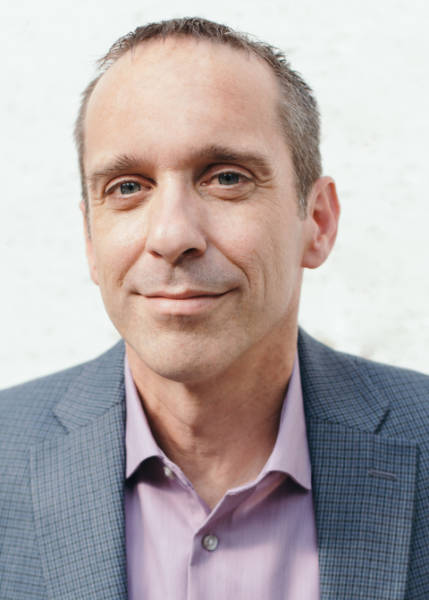 |
What do you make of the comparisons between Mendelssohn's Lobgesang to Beethoven's Symphony No. 9?
There are obvious similarities, since the listener will hear three orchestra movements (labeled in traditional format) followed by a choral movement. The difference is that Mendelssohn himself labeled this work as a "symphony-cantata on words of the Holy Bible for soloists, choir, and orchestra."
What does it take to prepare the Charlotte Master Chorale for a work of this scope?
Compared to Beethoven 9, there is more material to prepare. Also, Mendelssohn was more understanding of the voices and their ranges and capabilities. Beethoven is extremely challenging for vocalists due to the extreme ranges, particularly for the sopranos.
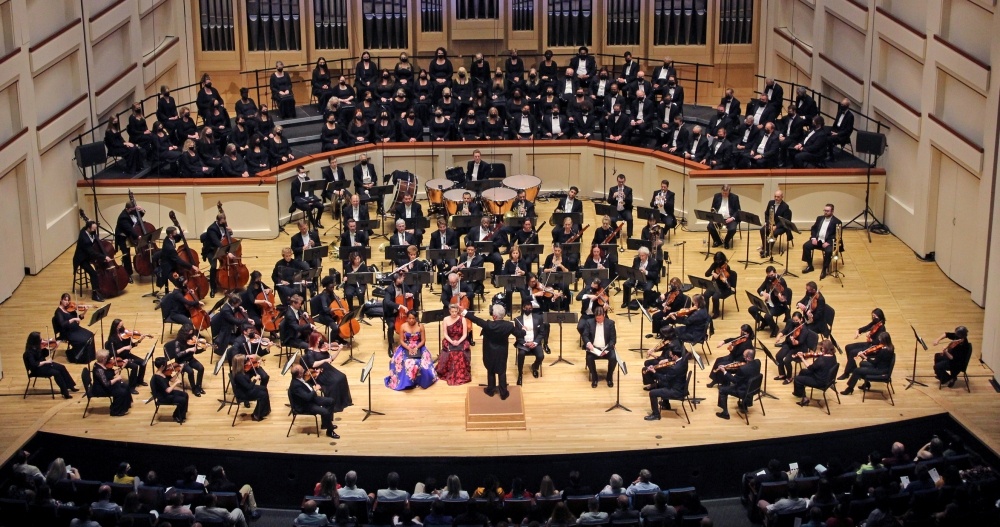
What are your favorite moments in the work?
The opening chorus, the utilization and treatment of the "Now Thank We All Our God" tune in the eighth movement, and the final fugue.
What are you looking forward to most about this performance?
It is always a joy to collaborate with the Charlotte Symphony, especially on works that our Charlotte audience needs to hear!
The Charlotte Symphony and Charlotte Master Chorale perform Mendelssohn Hymn of Praise on March 24 & 25 at Belk Theater -- Get tickets today!
Read more
Joshua Weilerstein on Brahms’s Fourth Symphony
January 19, 2023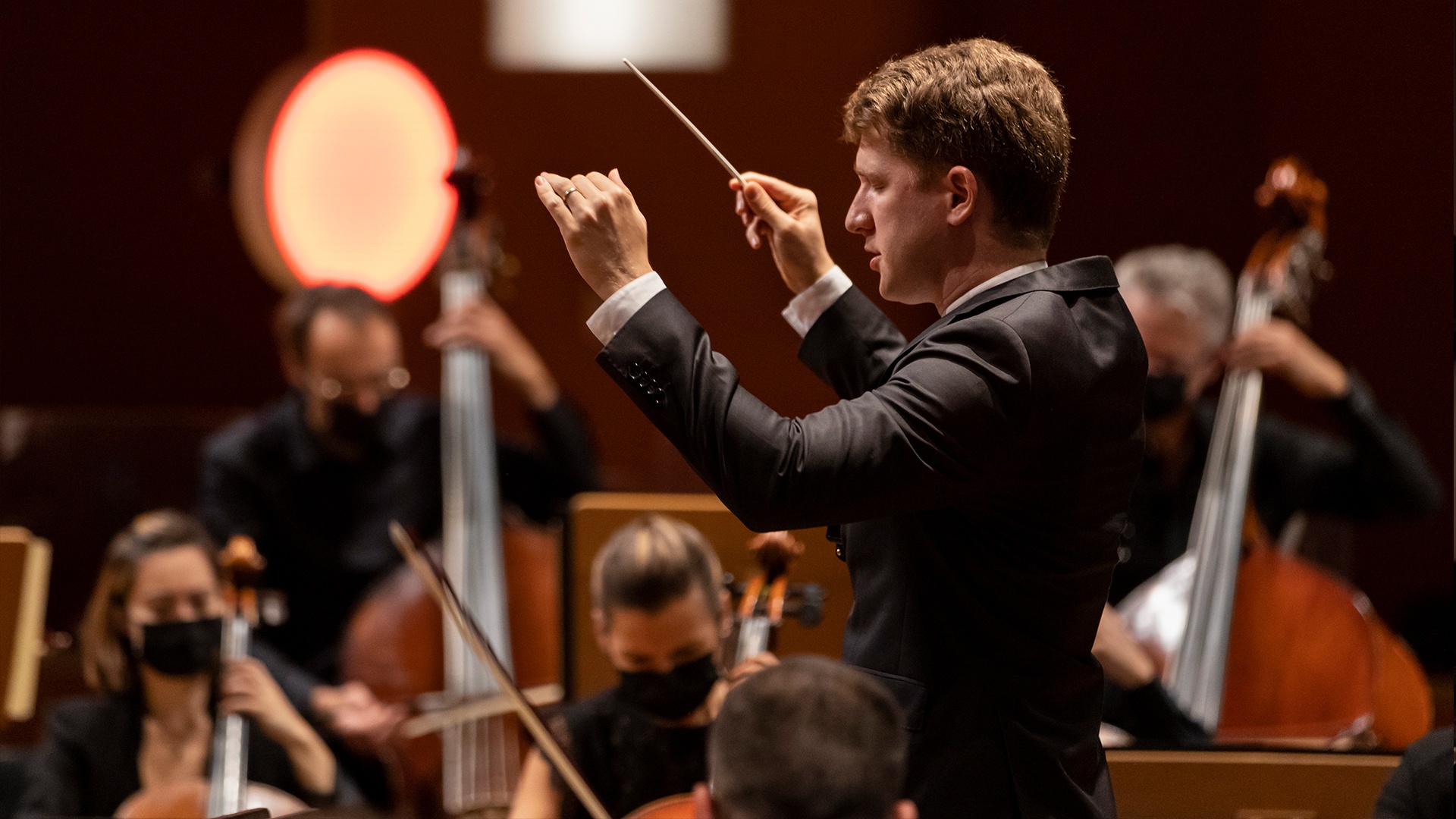
Acclaimed conductor Joshua Weilerstein makes his debut with the Charlotte Symphony on February 10 & 11, leading the orchestra in Brahms's Symphony No. 4. This remarkable work showcases the composer's mastery of form, counterpoint, and emotional expression; and is a must-hear for classical music lovers and newcomers alike. The program will also include Ethel Smyth's On the Cliffs of Cornwall and Edvard Grieg's Piano Concerto in A minor.
Here, Joshua Weilerstein shares some insight into this incredible program.
What stands out to you most about this concert?
Brahms's Fourth Symphony is one of the most intensely passionate pieces that Brahms ever wrote. It represented 'the end' for him in many ways. It is his last symphony, last major orchestral work, and it seems to almost express an apocalyptic sense as well, as Brahms saw the deepening fissures and cracks that would result in the breakdown of European society in the years after he wrote the symphony. At the same time, it is a piece full of all the love and warmth that makes Brahms's music so irresistible to us.
To put it briefly, it is a symphony that encompasses the entire gamut of human emotion, and its intensity makes it unforgettable to hear live! It's also a great pleasure to be doing the music of Ethel Smyth and Edvard Grieg as well. The three composers once shared a meal together, which makes us feel like we've gone back in time to hear this music.
What are you looking forward to about working with the Charlotte Symphony?
I've never been to Charlotte before, so I'm very excited to be meeting the orchestra for the first time and to get to know the city. It's always a thrill to make music with a brand new group of people.
Learn more about this program from Joshua Weilerstein at the pre-concert talk, held before each concert on the Mezzanine Level of the lobby at 6:30 pm. Get tickets today!
Read more
Amy Orsinger Whitehead Lends a Healing Hand
April 13, 2022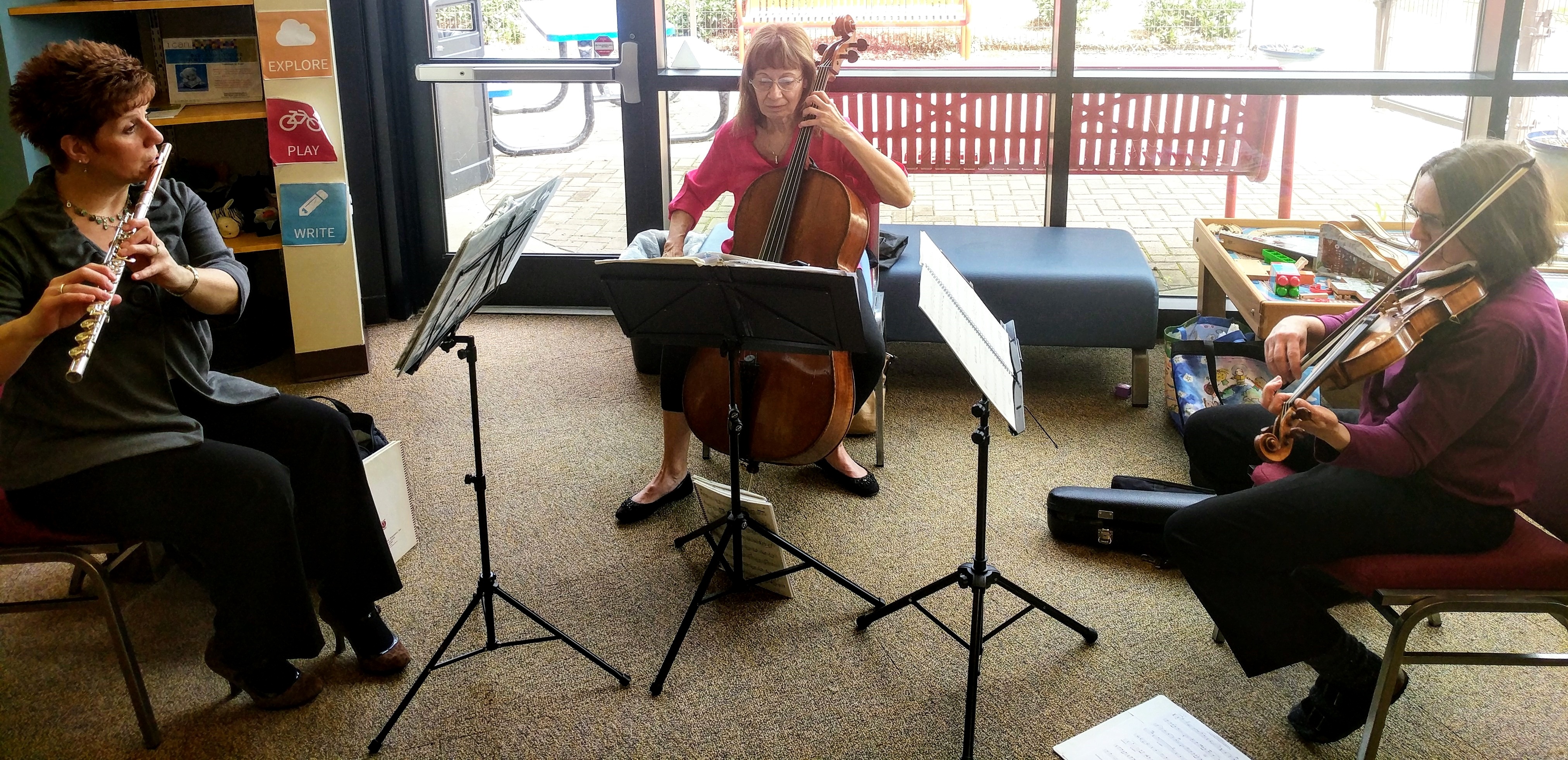
For over 20 years the Charlotte Symphony's Healing Hands program has sent musicians to perform in area hospitals, libraries, senior care centers, and shelters for people experiencing homelessness. Since the program's inception, CSO Flutist Amy Orsinger Whitehead, violinist Elizabeth Pistolesi, and cellist Deborah Kauffman Mishoe -- named The Laurel Trio -- have been using their music to enrich the lives of patients, residents, and community members throughout Charlotte. We recently caught up with Amy to discuss what makes this program so unique and special.
Why is the Healing Hands program so important to you?
Our trio has done lots and lots of Healing Hands performances throughout the years taking our music on the road to wherever the need exists. I think it's very important to meet people where they are because some get to a certain point where they're not able to come to the concert hall to hear us play. If we are able to take ourselves to where people live and give them the gift of beautiful music something they've enjoyed all their lives it's a privilege for us. I think, honestly, that we get as much out of it as the people we perform for. It's really a lot of fun and it's quite meaningful for us because we enjoy being able to make a little bit of a difference in someone's day with our music.
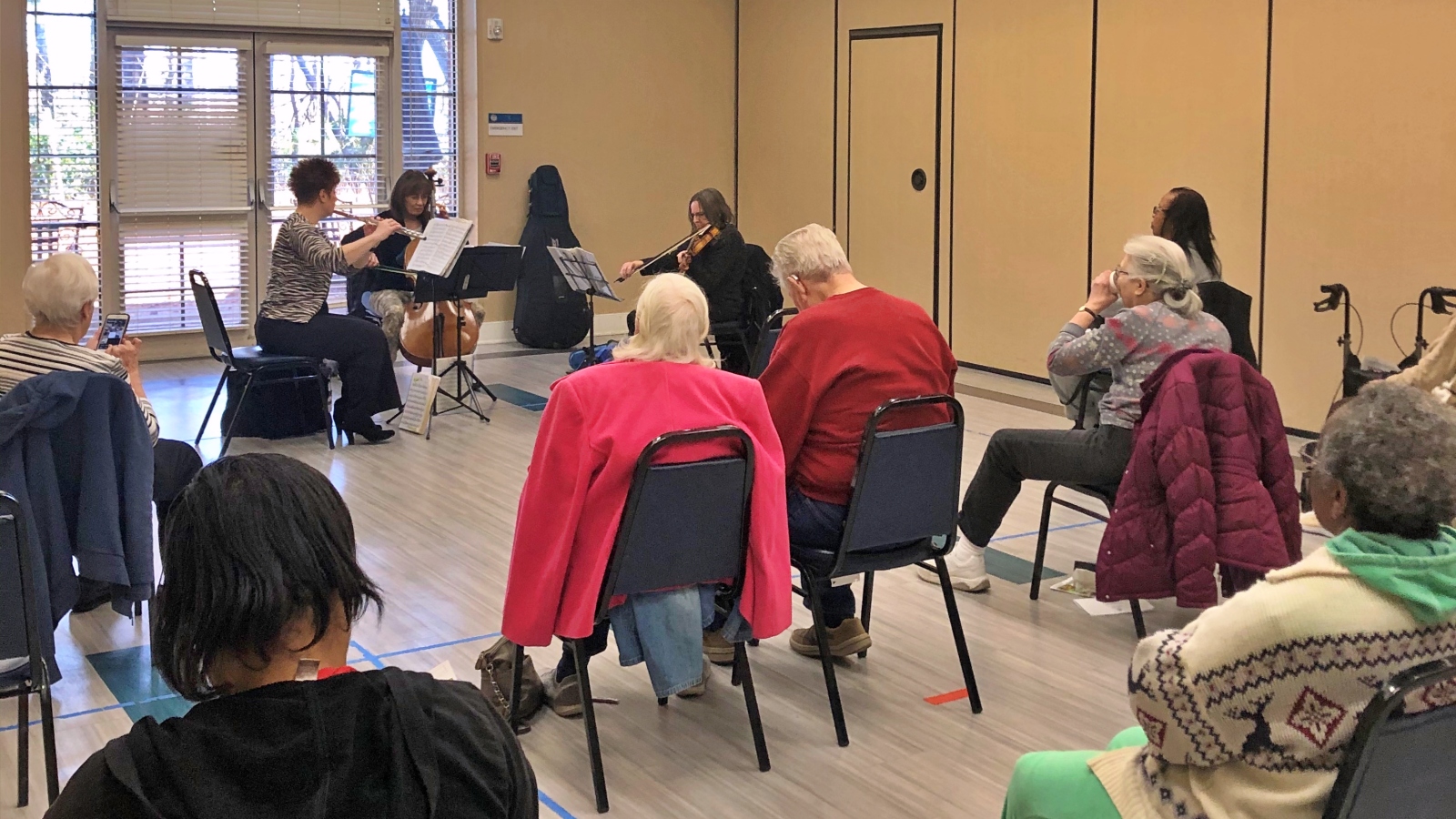
How does the audience respond to your performances?
This has been quite powerful for us. In a situation where we're playing in a dementia setting, you might see a resident that doesn't seem to be responding to anything around them, but you'll see them react and respond to the music and even start singing along! We have a Motown medley that has inspired a lot of spontaneous dance parties, too! The music reaches deep inside people and has an impact that might not be easily achieved outside of music, and that is just so incredible. It's actually pretty hard to play the flute when you feel like you're getting choked up or teary-eyed, and so it can be a bit hard for me, I have to tell myself not to get swept away by the emotion of it. Seeing the immediate impact that we're having to think that we're making even the tiniest difference for people is really wonderful, and we feel so fortunate to get to have that experience.
Your trio performs a lot at senior care facilities and senior centers, but you've also performed at Moore Place, a supportive housing residence for chronically unhoused adults.
Yes, we have! It's a whole different age range than we usually play for, and we love to hear them tell us about their stories and musical connections the songs they remember and the instruments they played in school. Music can help ground us to where we are currently, moment by moment, but it has such a great way to take us back to a previous time in our lives. It's pretty incredible when we get to see this happening and experience the music the way the people listening are experiencing it. It's nice to relive people's memories with them.
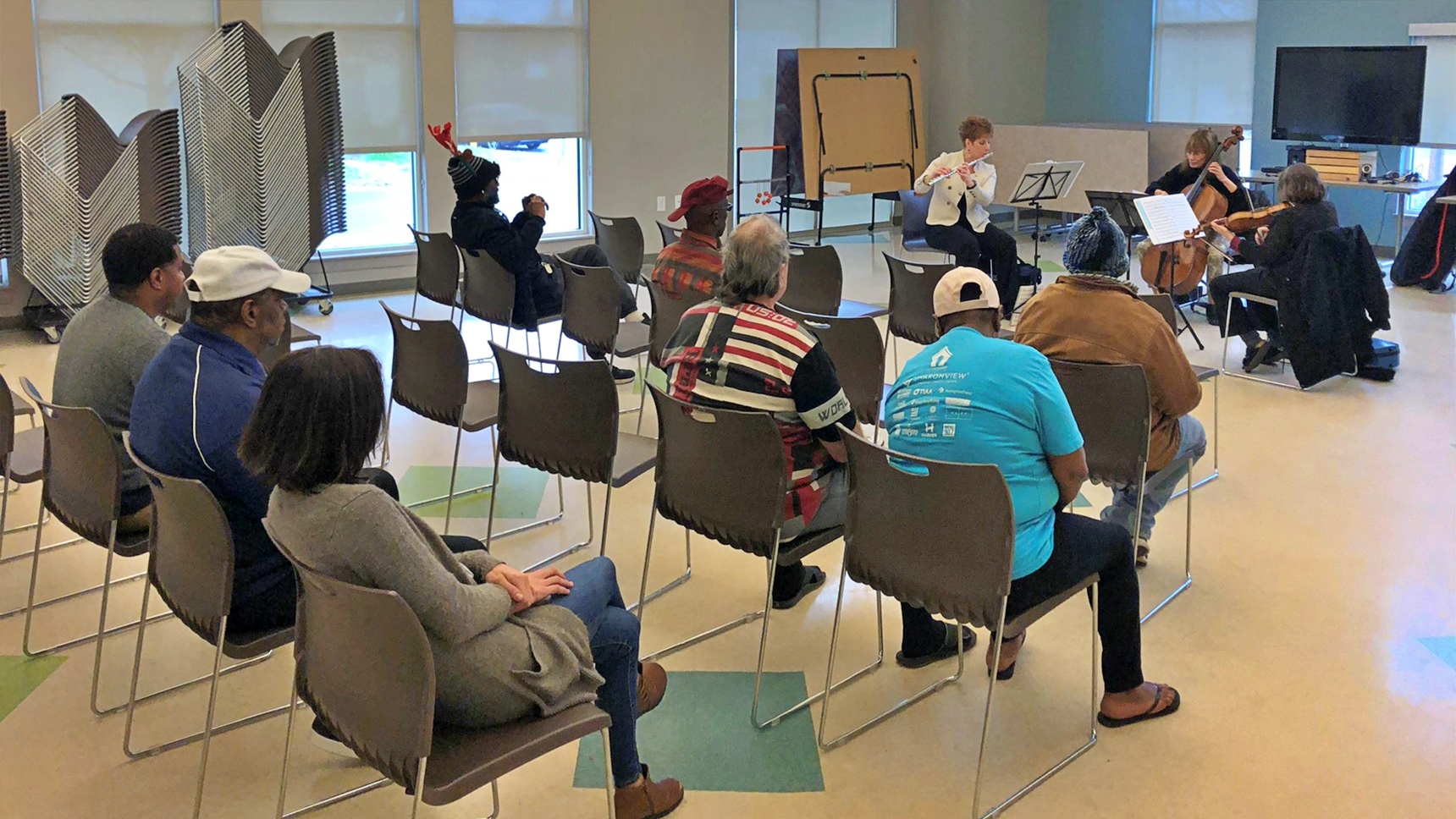
How was the program able to adapt during the pandemic?
We were able to pre-record two programs, one holiday program and another non-holiday program for people of all ages. We provided online performances where the video was played and each one of us would announce the next piece live. It was a really great mix of technology and heartfelt love between all of us! We loved being able to interact with the people who were zooming in and we always had a really fun chat thread during the performance. People were really needing something like this in their lives at that moment. And to be able to have a holiday concert in December, when we were so closed off from each other for so long was extra meaningful.
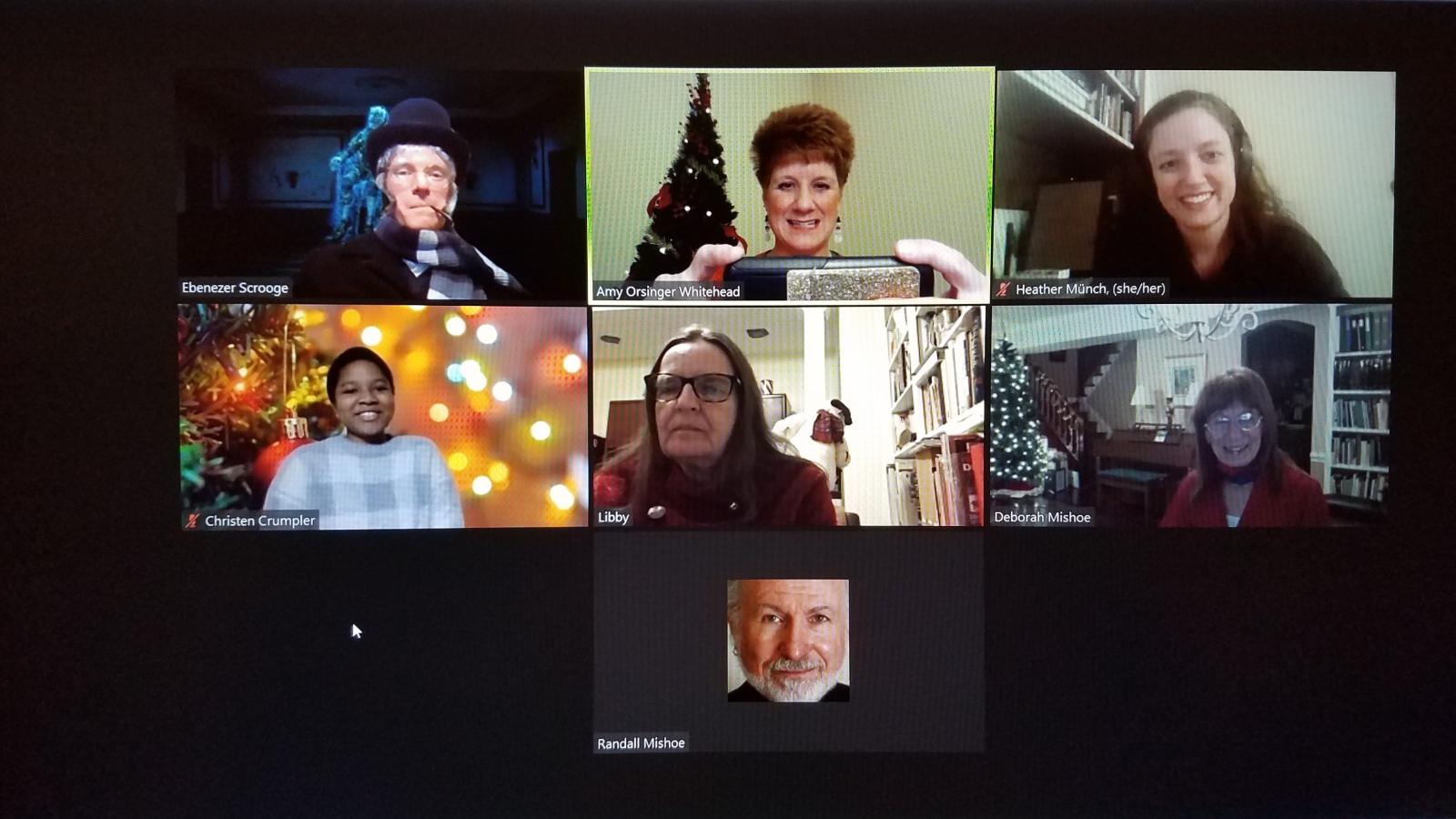
Do you have a favorite memory from a Healing Hands performance?
I think my favorite moment ever was when we were playing at a senior living facility called Renaissance West. That's the place where they have been known to break into spontaneous dance parties and they love to sing along! One time, during a holiday concert, I could see a lady moving from person to person and I could tell she was on a mission to get everyone in the room to do something. We didn't think much of it, but at the end of the concert they brought up to us a Christmas card that they had all signed. It was just so sweet, and I carry that with me in my folder because it's such a special memory. That was such a great day, I can't think of it without smiling.
Learn more about the Charlotte Symphony's Healing Hands Program. Read more
Alan Black on Stepping Back with Grace
March 16, 2022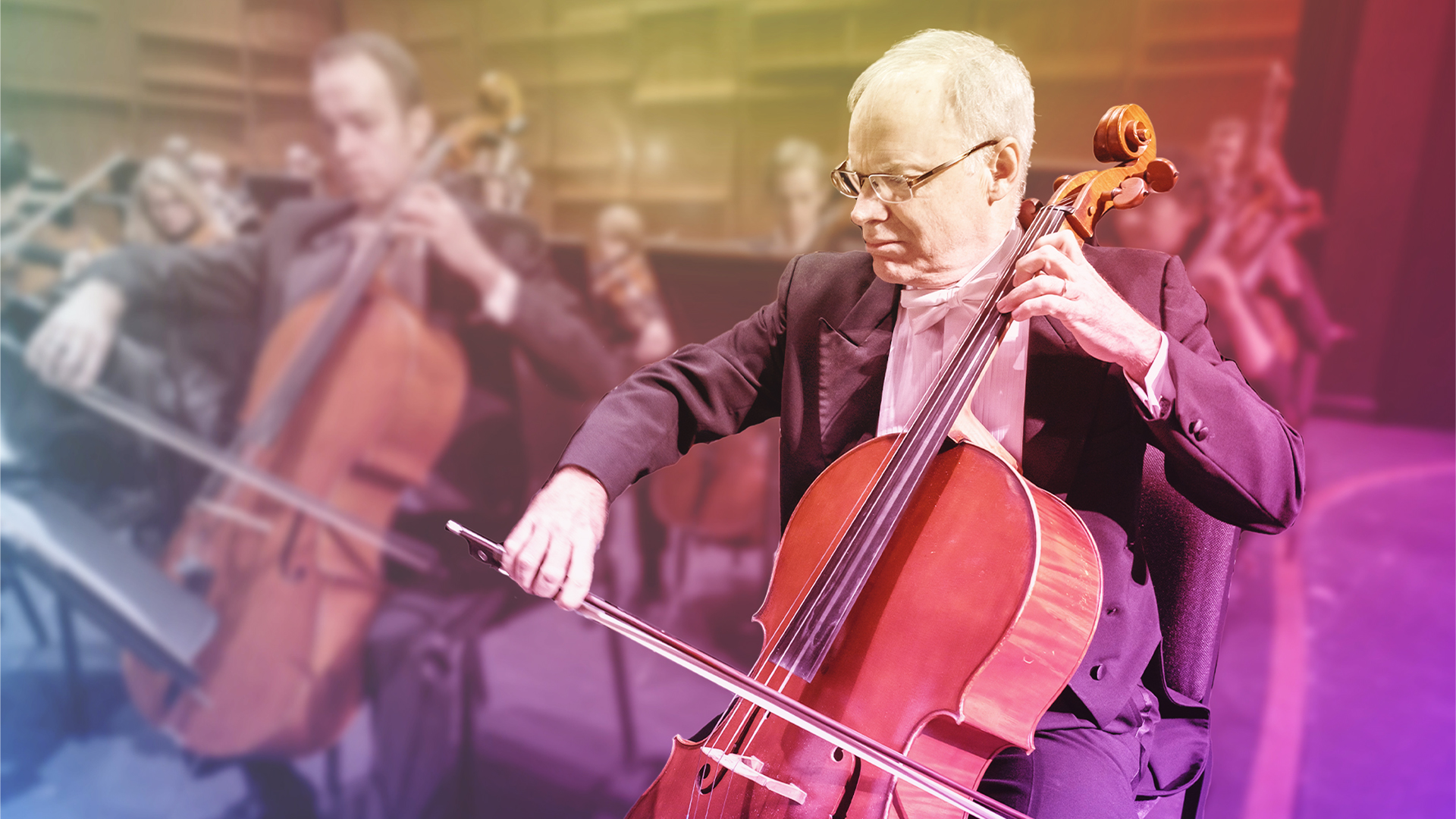
A fixture of the Charlotte Symphony since 1986, Principal Cellist Alan Black is stepping back from his role of leading the cellists to continue playing in the section. Black will be ending his tenure on a high note at the end of our 2021-22 season, having played the solo in John Corigliano's Symphony No. 1 and capping off with his feature in the Music & Healing concert at Queens University on April 3. We talked with Alan about his decision to step back now, his favorite memory with the CSO, and his hopes for the section as he ends his tenure as Principal Cellist and begins the 2022-23 season as Principal Cello Emeritis.
Why have you decided to step back into the section at this time?
Well you know, I've been thinking about this for a couple years. I'm going to be 65 in a month and I'm thinking to myself, well, what else do I need to accomplish as a principal player? I've done all the solos....my colleagues are great cellists and I feel the talent level has risen. They're great players and so it's time for somebody else to do it. And the stress of sitting principal is actually fairly strong.... I want to enjoy playing without the stress of the job. And since I've done basically everything I've wanted to do and checked off all those boxes, I feel like it's kind of time for me to let somebody else take over the mantle; let somebody younger come on in and provide a fresh vision.
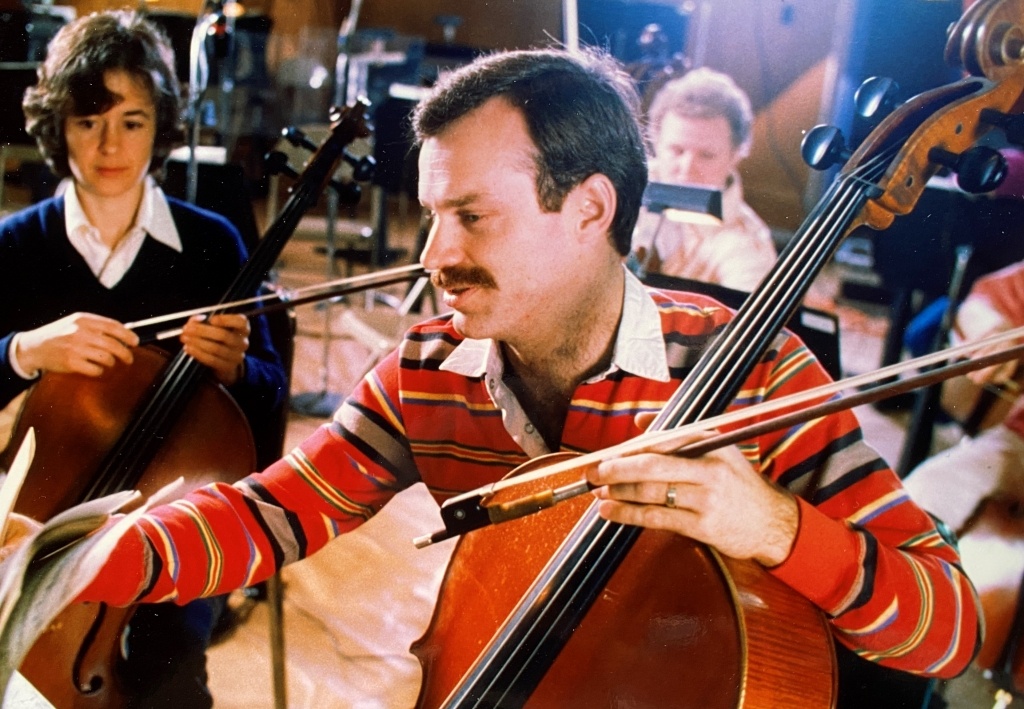
How have the other players reacted to your decision?
I think a lot of them were surprised, which makes me feel good because they were like, "Wait a minute, what? Why are you doing that?" A lot of them didn't realize I was going to be 65 and that makes me feel good....I think my cello colleagues were surprised and they've been very gracious about it.
After so many years as Principal, you must have some great memories.
Oh, yes! The highlight of my career was in 2000 when Yo-Yo Ma was in town performing with us and I got to play the Vivaldi Concerto for Two Cellos with him. Aside from being the most visible and famous musician on the planet, he is also an amazing human being -- warm, engaging, and filled with humility. We had a great time together and hung out at the after-party on the 60th floor of the Bank of America center. I had a great time and will never forget this moment. Ultimately, it was because of this concert that five years later I was able to purchase the cello I bought from him. In many ways, he has been the most influential person in my musical life, and I am filled with gratitude for this.
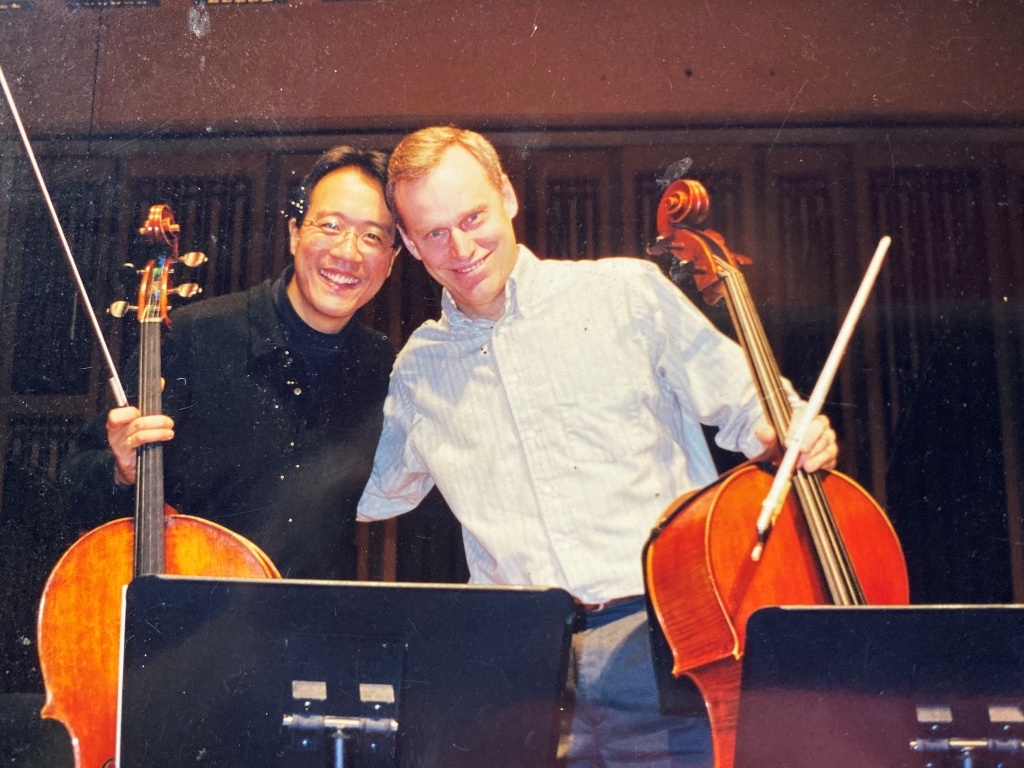
Do you have any words of wisdom for your successor?
I felt like as a principal the most important thing I could do is manage the section in a way that creates a great working atmosphere; a collegiality within the section. That's been my most important goal for the last twenty years, that I want us to all get along and be happy together....To me, the most important thing is that you've got to treat your colleagues with respect and you've got to treat them right.
What are your hopes for the cello section, and the CSO as a whole, for the coming years?
I hope we can continue to have great dialogue with our management and the board; that we continue to work as a team the way we did during COVID. These have been the best two years of my entire career in terms of our working relationship....it's been great and that's what we should have. We should have a great working relationship: between the players, the management, and the board. We need to do that....and I'm really hopeful for that going forward.
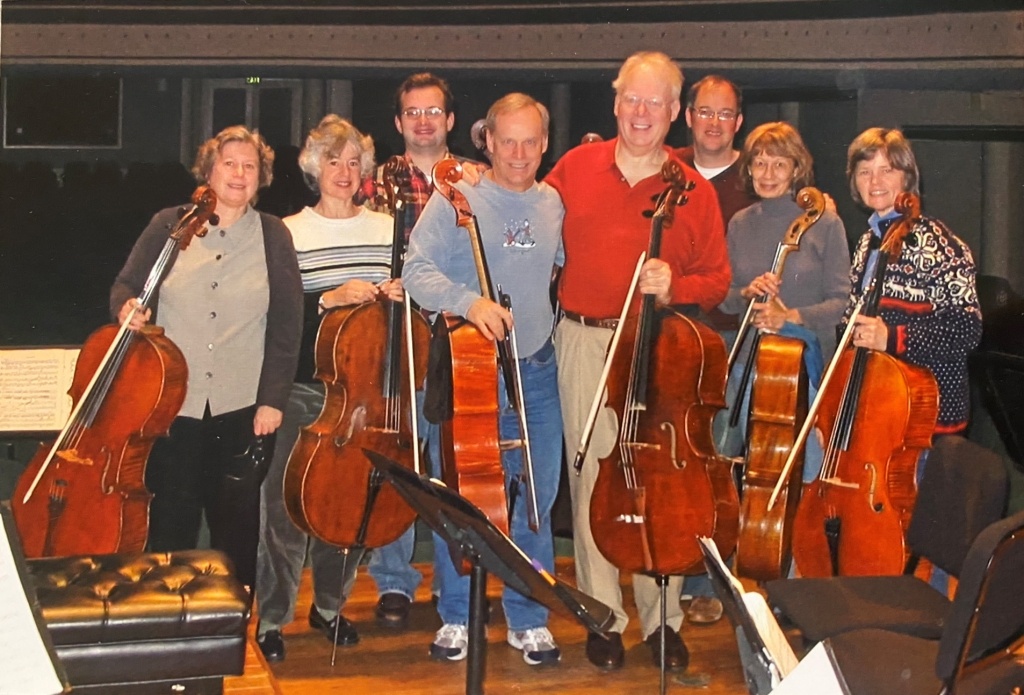
What can you tell us about your part in Music and Healing?
Two years ago I commissioned Leonard Mark Lewis to write [I Will Wade Out] for cello and piano, and we played it at Davidson [College] when I was on faculty there. And I really loved that piece. So I was thinking about what I wanted to do -- because I want to go out strong, like "Yeah, I'm making this decision. I don't have to, but I am because I just want to go out on a high note." And I thought, "You know, the perfect thing to do was play Mark's piece," because Mark and I are very close friends. I really like it, and it will give him a chance as a local composer to be showcased and to have another orchestral piece out there. So I'm really excited about us being able to do that. We've done a lot of tinkering with it since we played it two years ago. So it's been really neat to sort of reconnect with it and find more things that are amazing about it. So yeah, it's going to be fun. I'm really excited about it and it's a new venue that we've never played in, so I think it will be a really nice addition to the program.
Is there anything you'd like to say to the audiences who have been with you for so many years?
I want to say thank you to everyone, it's been such an honor to be Principal Cellist of the Charlotte Symphony. It's been an absolute joy!
Join us at Queens University for Alan's final solo performance as Principal Cellist of the Charlotte Symphony.
Read more
In Person with Jessica Cottis
January 18, 2022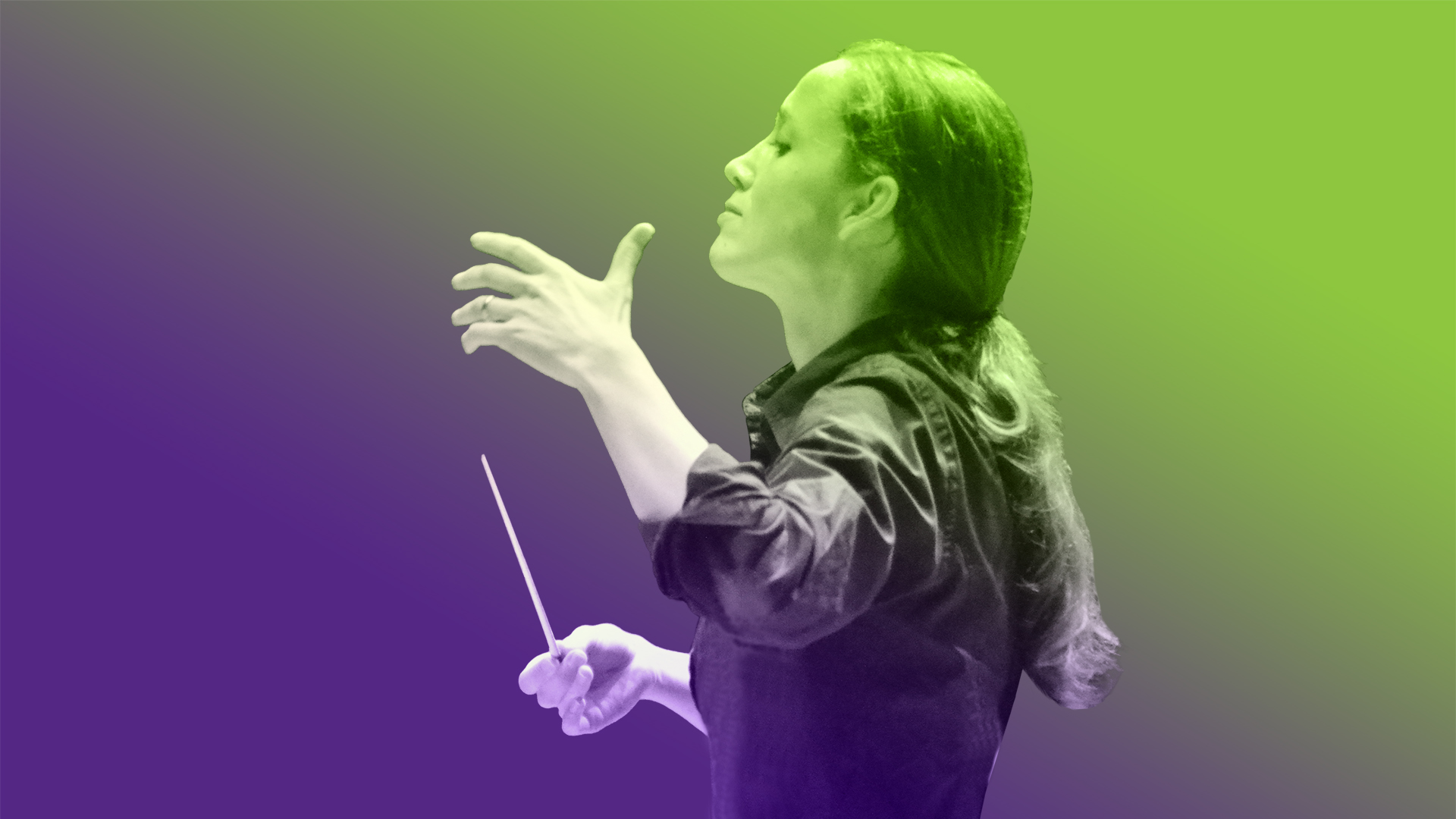
This month, Australian-born conductor Jessica Cottis makes her debut with the Charlotte Symphony to conduct a fascinating program including the Charlotte Symphony premiere of Kurt Weill's witty and theatrical The Seven Deadly Sins. We sat down with Ms. Cottis to discuss her path to the podium and what the audience can expect from her debut performance.
What led you to pursue conducting as your career?
For me, growing up in a very musical family, music was very much a means of expression and communication, even more so than speaking. I did my undergraduate as an organist and musicologist and had a really excellent career, but I got carpal tunnel syndrome in my twenties and I never knew when my hands would be reliable. I needed to rethink how I was as a musician and it was incredibly hard, particularly so because I had started music at such a young age. Conducting was very intoxicating - to think there was this opportunity to get so much depth and nuance from a symphony orchestra. I was like a match struck in the dark - it was sheer exhilaration that we as humans can express thoughts, emotions, and stories through this incredible art form and this incredible instrument, which is the orchestra itself.
What is it like stepping in front of a new orchestra for the first time?
I love meeting new orchestras because they all have such a personality, and I never know what it's going to be until we start making music, really! I took a look at many of the recent programs that the Charlotte Symphony has put on and they seem forward-thinking, friendly, and really passionate about music. For me, one of the greatest things about being a human is being able to create and participate in art, and I really feel that passion from everything I've seen. So I'm very much looking forward to being in Charlotte and meeting the orchestra.
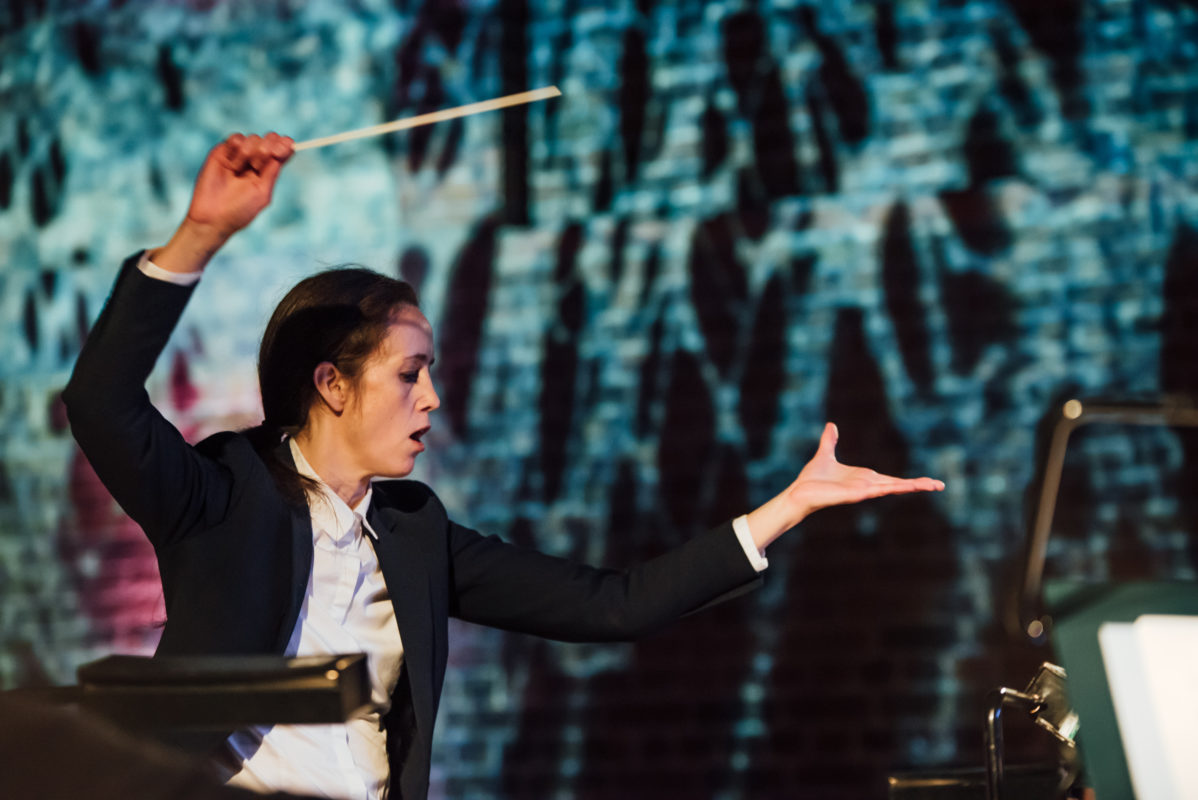
You've created such an interesting program, from Stravinsky to Kurt Weill and Jessie Montgomery. What goes into programming a concert like this?
One of my greatest interests in music is programming, and in the way that we can find connections between music that might be so disparate - 300 years between pieces or completely different focuses from the composers, but that one piece might lead somehow, imaginatively, into another and maybe even open our ears in new ways so that we can hear old music afresh.
In this program, as with any program, I tend to start with a seed of an idea, and then from that seed I look to see how it grows, and I never know from the beginning how it will grow! The initial idea of this program was that I really wanted to do The Seven Deadly Sins with the Charlotte Symphony. Somehow that felt like a perfect matching of minds and musical intellect. It's such a fantastic piece, so incredibly theatrical, and it has such a brilliant way of depicting humor, ideas, and nuances through Kurt Weill's musical style. He had only just fled Berlin for Paris in 1933 and this is his imaginary fantastical version of the United States; of this young woman sent out into the world to make money by her greedy exploitative family. It's almost 100 years old but it's still so fresh. The work includes so many different musical styles: foxtrots, a church choral, barbershop quartet, tangoes, and lots of wit. And that wit is really what led me to the Stravinsky.
That would be the Stravinsky Circus Polka?
Yes, the piece was written for Ringling Bros. and Barnum & Bailey Circus, for elephants to dance to - which is incredibly preposterous! There's a certain theatricality to the circus that works really well with the Kurt Weill piece.
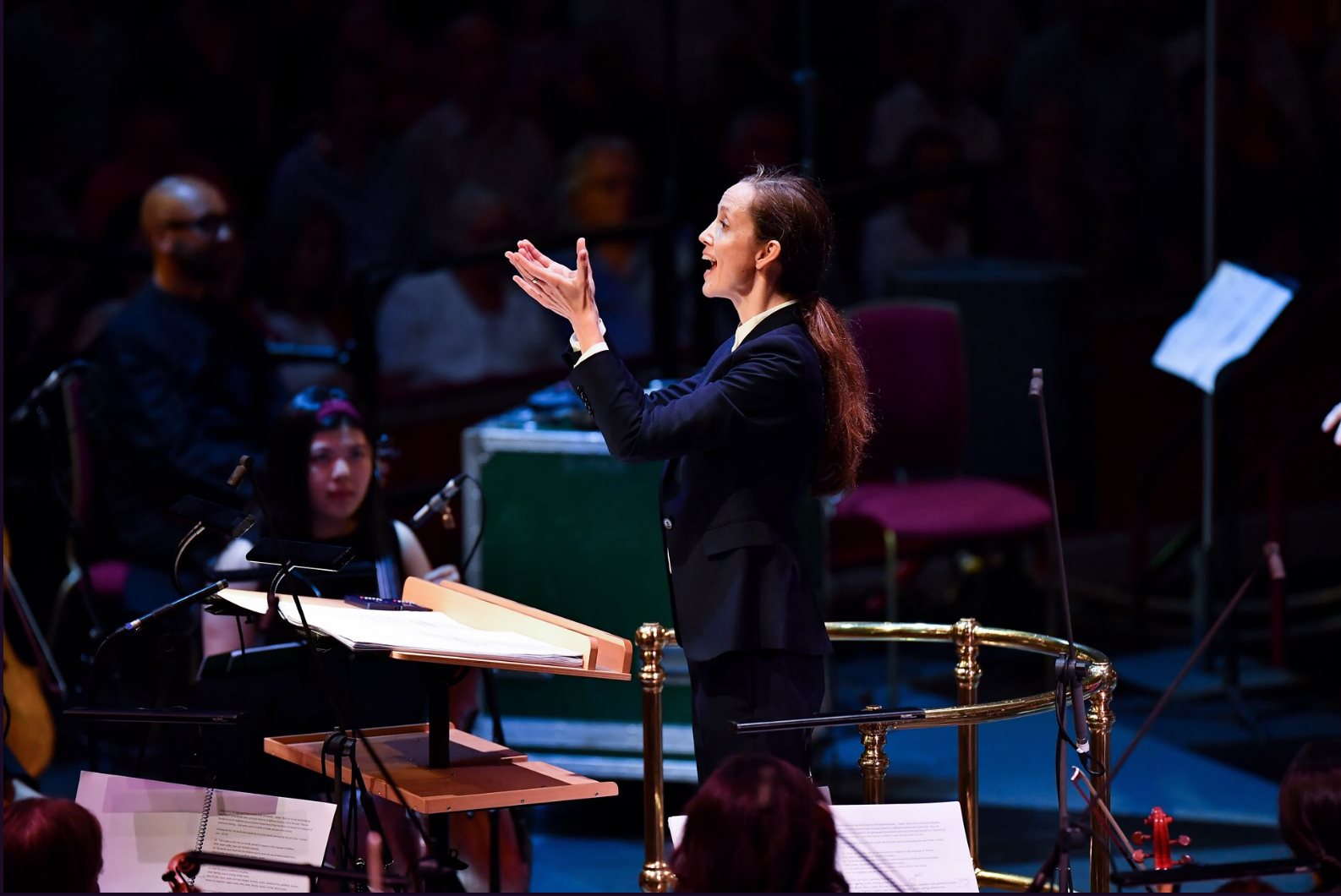
Which leaves us with Ravel's Piano Concerto and Jessie Montgomery's Strum.
The Ravel has a strong jazz influence, which linked so well to both the Weill and the Stravinsky. And I'm very much looking forward to working with Stewart Goodyear, I think this will be a really great meeting of musical minds. I've known Jessie Montgomery's pieces for a while and I've conducted Strum in numerous places - I just love it! It's just what it sounds like, the string players spend quite a lot of time strumming their instruments rather like a banjo. I thought it linked in well to the dichotomy of the classical being influenced by more popular styles of a particular time.
I've heard that in your limited spare time, you're learning to fly helicopters!
Yes! I've had to stop due to the pandemic, but I look forward to getting back into that whenever it happens. There's something really special about flying. It's exhilarating and humbling, and sort of life-affirming being able to lift oneself above where we normally are and look down and have a birds-eye view. As musicians, we spend so much time on forensic detail - and we must, it's so important - but keeping an eye on the bigger visual architecture is so freeing, really.
Read more
Celebrating Arts in Education Week
September 14, 2020This week we're celebrating Arts in Education Week, a national celebration recognizing the transformative power of the arts in education. To learn more about the positive effect music education has on students, we caught up with Crystal Briley, a music teacher at University Park Creative Arts School.
 |
How were you introduced to music as a child? I grew up in a musical household -- one where many of my memories are tied to singing together at family gatherings. Music was a natural influence in my life. While many others were outside playing games or riding bicycles, I was learning piano or singing various songs my family had taught me. I am extremely grateful I was able to have the experience of private lessons and that my natural gifts leaned towards music. |
How do the CSO's Education programs help you to achieve that?
Many of my students have never been exposed to the arts outside of our classroom or their own home. The partnership with the CSO through the Link Up program and other various educational programs has offered our students the opportunity to see real life musicians and given me a way to introduce my students to classical music in an accessible and relevant way. When students step foot into the concert hall and hear the insistent call of Stravinsky's Rite of Spring or sing along with the eerily forceful O Fortuna from my education mentor, Carl Orff, it does not go over their heads -- it settles deep within them. They experience the music in the classroom and then bring their 'practice' to the hall and go home forever changed. Our time with the CSO is one of the more requested things we do ... "when do I get to play with the CSO at Link Up?" I must admit, the experience of listening to over 1000 students play recorder together with the CSO is an experience very hard to replicate!
Do you have any specific memories of music inspiring or affecting one of your students?
Many of my students have been inspired by music. But one really strikes my mind. We were sitting in class one day learning the recorder parts to The New World Symphony melody. It is a simple theme and one which I thought would be lost on my students. We had spent time working on the piece through listening, playing, and movement. It was finally at the time where I asked them to reflect on what this music meant to them personally. Her response was one that I will never forget. "This music makes me calm. When everything around me seems crazy, I can listen to this song and find peace." When a child can bring such wisdom to a simple and haunting melody, I find that I too am inspired.
| Why do you think it's important to keep the arts in school? We can talk about how the arts are important to our student's education or to our economy and industry. But it is Suzuki who said, "teaching music is not my main purpose. I want to make good citizens. If children hear fine music ... and learn to play it, they develop sensitivity, discipline, and endurance. They get a beautiful heart." At a time where the social emotional well-being of all humans is at stake, we must take care to teach students to have beautiful hearts. |
 Link Up 2017 |
What inspires you to teach?
I pursued a career in opera before teaching-- I still love singing and listening to the genre but my heart is with my students. I absolutely love teaching and it is hardly a "job" to me. Through all the difficulties, there is nowhere else I'd rather be. My students give me such joy and they are the reason I get up and go to work every day -- even if it is in a crazy virtual space! Read more
Meet Your CSO’s Newest Musicians
September 1, 2020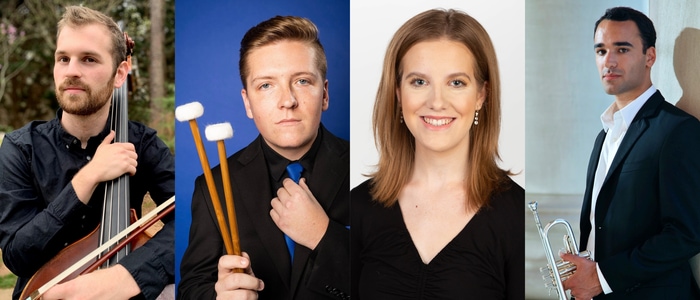
This season, you'll notice a few new faces in the orchestra! We caught up with Judson Baines, Jacob Lipham, Alaina Rea, and Gabriel Slesinger to welcome them to the CSO and learn a little more about who they are.
Judson Baines, Assistant Principal Double Bassist
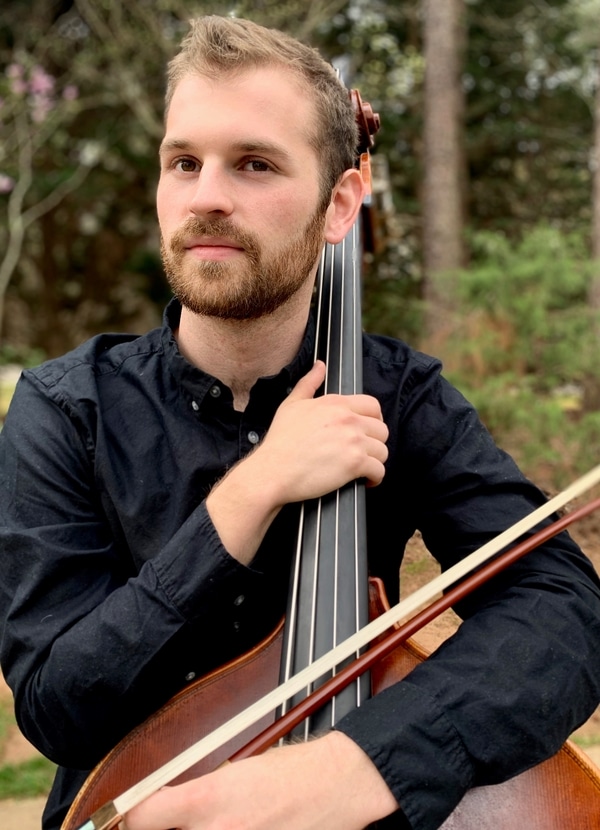 |
Where did you grow up? I was born in Wilmington, NC and grew up in the Raleigh area. I've spent a considerable amount of time in the mountains of western part of the state, as well as the coast, enjoying the merits of living in North Carolina throughout my life! What do you look forward to most about living and working in Charlotte? I think it's really awesome that I can be in my home state and have my family easily visit me and vice versa, so I'm really looking forward to that. |
What else should we know about you?
I would love the audience to know that I am genuinely so excited to join the CSO and play music with other people again after a long hiatus due to the virus!
Learn more about Judson.
Jacob Lipham, Principal Timpanist
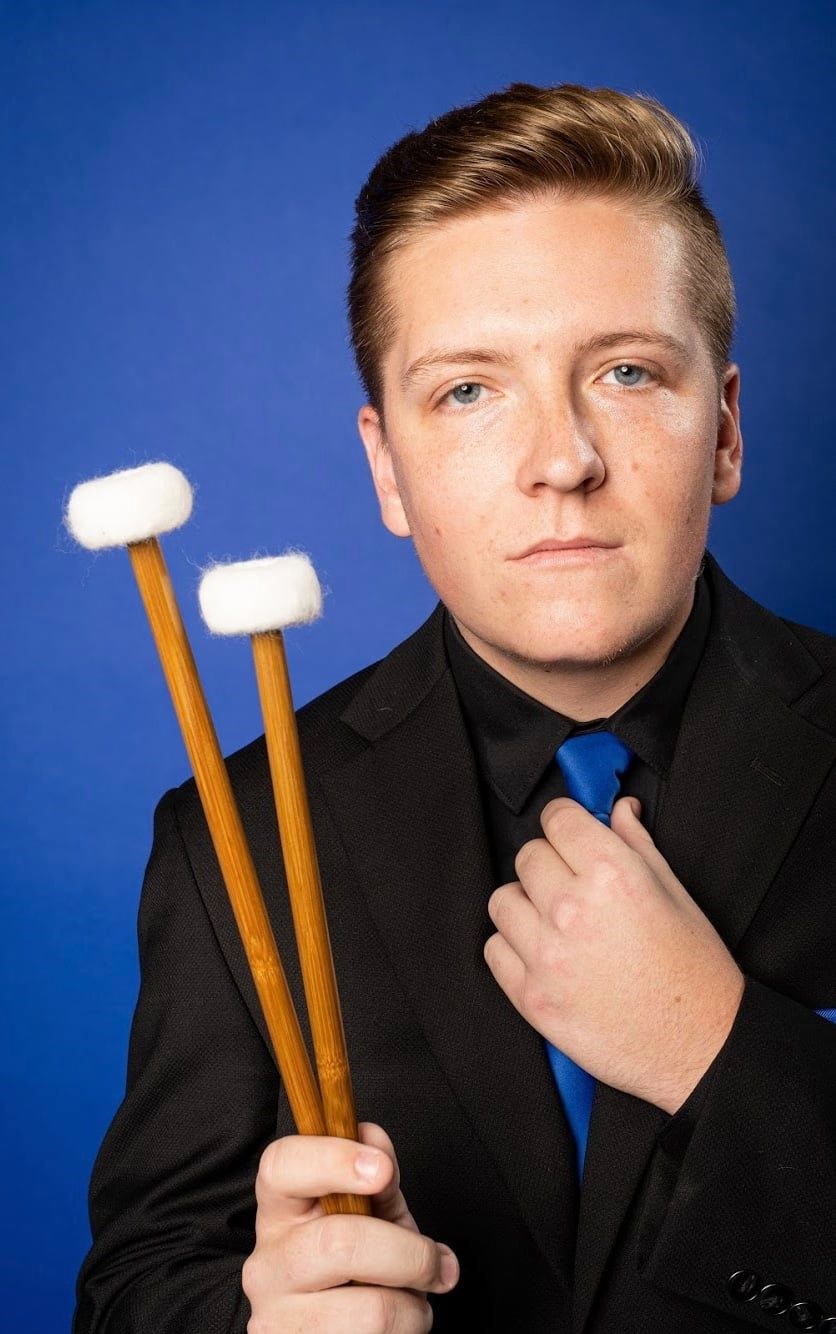 |
How were you introduced to music and the timpani? I began studying piano at a young age, around five, and really enjoyed it. When I got to middle school I decided to join the band. When it was time to pick my instrument for the band, the array of percussion instruments in the back of the room looked very enticing to play! Many of the kids wanted to play percussion, so my middle school band director prioritized students who had studied piano to join the percussion section. Thankfully I had studied piano, so I was able to begin playing percussion, and the rest is history! My decision to pursue orchestral timpani happened in my collegiate studies. I received my Bachelor's Degree in Percussion Performance at The Jacobs School of Music at Indiana University. |
While at Indiana University, I was introduced to a diverse range of percussion styles and fields of work. The experience I found the most excitement and joy through was playing timpani in the orchestra. The diverse sounds, colors, and roles the timpani can provide within an orchestra, in addition to the thrill of creating music beside colleagues, was more than enough to convince myself to narrow my pursuit to an orchestral career.
What do you look forward to most about living and working in Charlotte?
I moved to Charlotte recently, and I am very excited to explore and get to know the city more. The culture seems vibrant, diverse, and welcoming. I can't wait to explore the vast restaurant and brewery scene, and check out the local sport teams! I am so thrilled to be a new member of the Charlotte Symphony Orchestra, to begin making music with my new fantastic colleagues, and seeing you all from the stage hopefully soon!
Learn more about Jacob.
Alaina Rea, Assistant Principal Violist
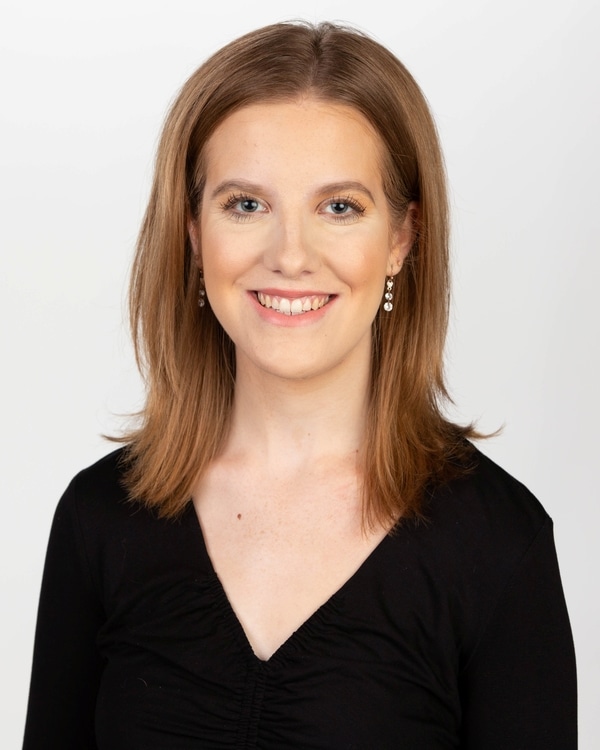 |
How were you first introduced to the viola? I started playing the violin at the age of 4 in the Suzuki method. During high school, my teacher suggested that I learn the viola. At first I reluctantly agreed but ended up loving it and decided to make the switch. What are you looking forward to about being part of the Charlotte Symphony? I am most looking forward to making music with talented colleagues and exploring different parts of the city. |
What do you do for fun when you're not practicing or performing?
Outside of music, I enjoy hiking, cooking, and spending time outside.
Learn more about Alaina.
Gabriel Slesinger, Third/Associate Principal Trumpet
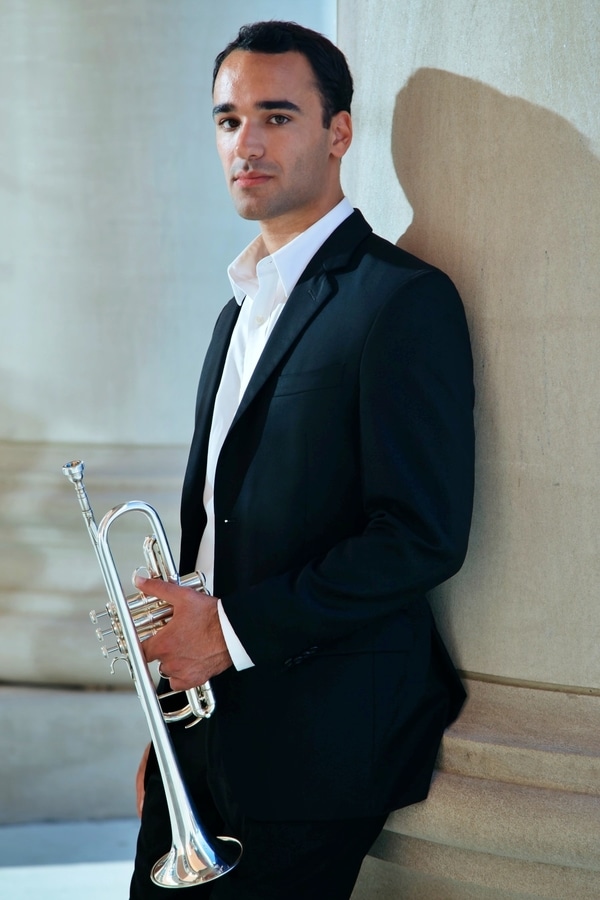 |
How were you introduced to music and the trumpet? My parents both value music and it was important to them that my siblings and I all learn instruments. My two older sisters played the piano and my older brother played the violin. My earliest musical memories are of hearing them practice every day, overhearing their lessons and recitals, and listening to the classical station on every car ride. As the youngest, I think I picked the trumpet because I wanted my instrument to be louder than theirs. My parents are fans of Louis Armstrong and Herb Alpert, so I had a little bit of awareness of these great trumpet players before starting. |
I really like the people in this orchestra. There is a very high level of playing here, but it's also like a family. The musicians here really stretch themselves and take risks in concerts. I love closing my eyes during a rest in a concert and pretending I'm an audience member, and I can't wait to be onstage again. The first concert back is going to be absolutely electric. I'm happy to live in a city where people value live music. The Charlotte Symphony has a wonderfully supportive audience.
Do you have any hidden talents?
I can name all the US presidents in less than 10 seconds.
Learn more about Gabriel. Read more
A peek behind the curtain with General Manager John Clapp
June 3, 2020 John Clapp at Summer Pops. Photo by Michael Harding, Genesis Photography Group
John Clapp at Summer Pops. Photo by Michael Harding, Genesis Photography GroupYou've had a pretty long history with the Charlotte Symphony. What was your path to General Manager?
Yes! My history with the CSO goes back about 20 years. I played bassoon and contrabassoon in the Orchestra - it was my first gig right out of Juilliard. Then I played in Grand Rapids Michigan for many years. It gives me a unique perspective; I've learned so much from being on both sides, and having to represent issues from both points of view. It's really given me an understanding that is unique and it helps me find the common ground.
What made you decide to come back to Charlotte after all those years?
The General Manager position was such a great opportunity for me; and the city itself enticed me to come back - it just felt alive! I remember coming back to see a concert and there were people everywhere - downtown wasn't like this before - the place was jumping, with a lot of young people around. It was a major transformation, and I remember hoping that it was reflecting on the orchestra as well, because this is what you want to see - people excited to be out.
So much of your job is planning for the future, how far ahead are you working now?
Well, we're always planning about 18-24 months ahead. All of the 2020-21 season is finished and 2021-22 is in the draft stage - the calendar is pretty much done, but still in pencil, so I can change it a few more times. And, believe it or not, the 2022-23 calendar is in the initial layout stage.

It sounds like it would be difficult to juggle all of those calendars and priorities at once!
Well, I have a secret weapon - it's a photographic memory. It's really helped me both in my musical career and in my management. I don't have to look at the calendar - if I've seen it, and worked on it, I know where it is.
So, basically you have a superpower. What would you love to see for the future of the CSO?
I think that some of our biggest successes have come when we dare to take something that people are used to seeing and do it differently. Take our Rite of Spring collaboration with the Ballet. Some people loved it and some hated it, but it was impactful. I remember seeing those kids - not too long after Trayvon Martin was killed - and they came out on stage with those hoodies on and people just put their heads down, crying. I'd like to see more collaborations like that. For years I've been trying to bridge the world of hip hop and classical - there are so many similarities that people just don't understand. I have some things in the works, but I'm not ready to divulge just yet!

14 years of passion for arts education & outreach with Chris Stonnell
March 4, 2020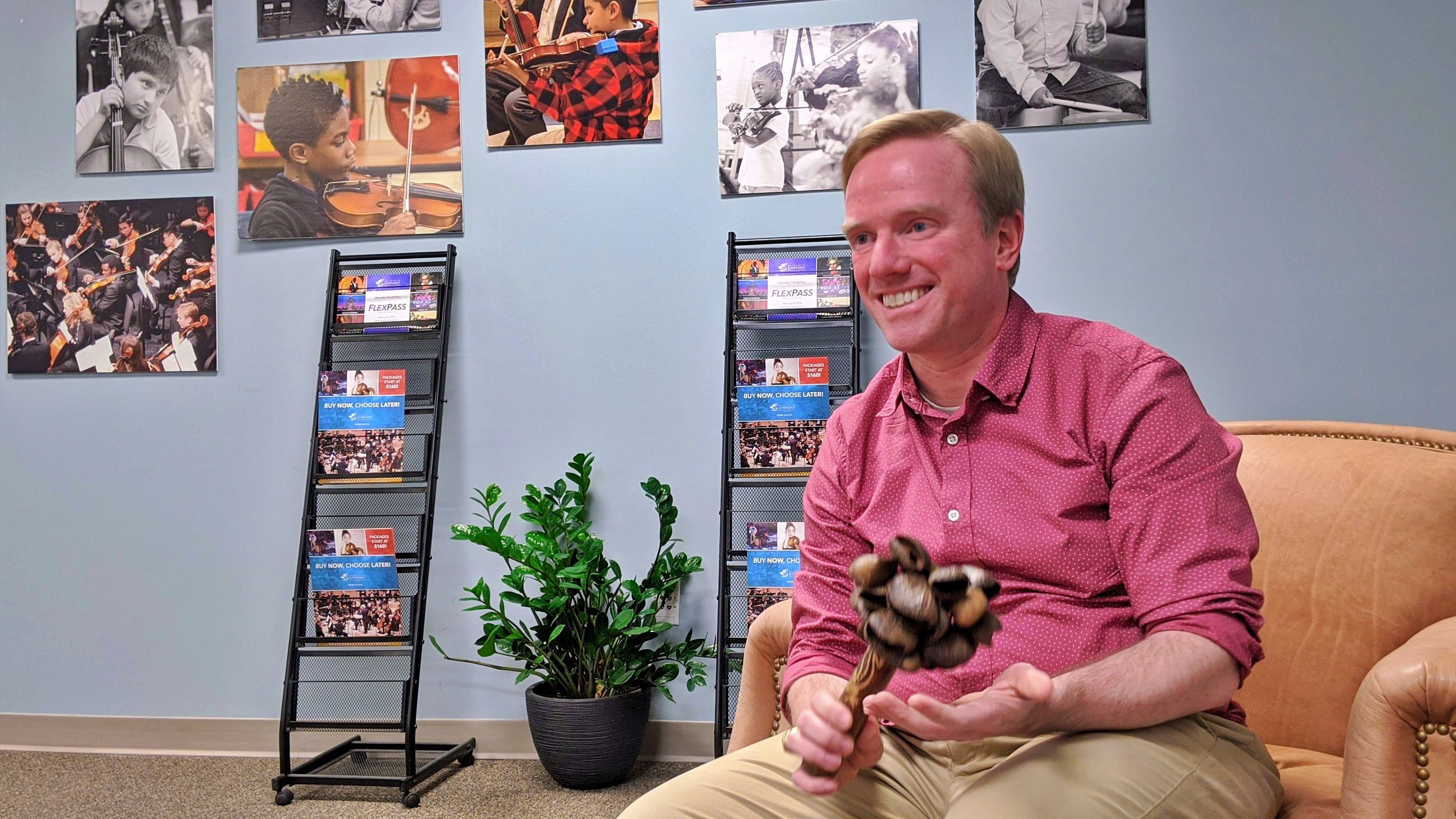
Chris Stonnell, Director of Education and Community Engagement for your Charlotte Symphony, has a long history with, and passion for, the arts in Charlotte. We sat down with Chris to learn more about why he chose this profession, and to find out what's next for education and community engagement at the CSO.
Chris, you've been working for the Charlotte Symphony longer than anyone else on staff. What was your path to the CSO?
I started working as a chorus and drama teacher in Cabarrus County where I grew up. I spent a little over 4 years teaching in public schools but found myself getting a little burned out from the grind. I loved the teaching part of it - the rewards of seeing the finished product - but didn't enjoy the classroom management, the paperwork, the endless meetings. I knew there had to be something else I could do with my knowledge of the arts and education so I took a chance and quit my job - three months before getting married.
Wow. And how did your significant other react to that?
Well, she still married me!
So, what came next?
Either through luck or divine intervention the School Programs Manager position opened up at the CSO! I started in January of 2006 and haven't looked back.
| What changes have you seen in the Charlotte community through your years here? It just continues growing; and with it so does the diversity of the community! The CSO has really been responding to all of this growth. We're reaching new populations and our community outreach has really taken off in the last few years. |
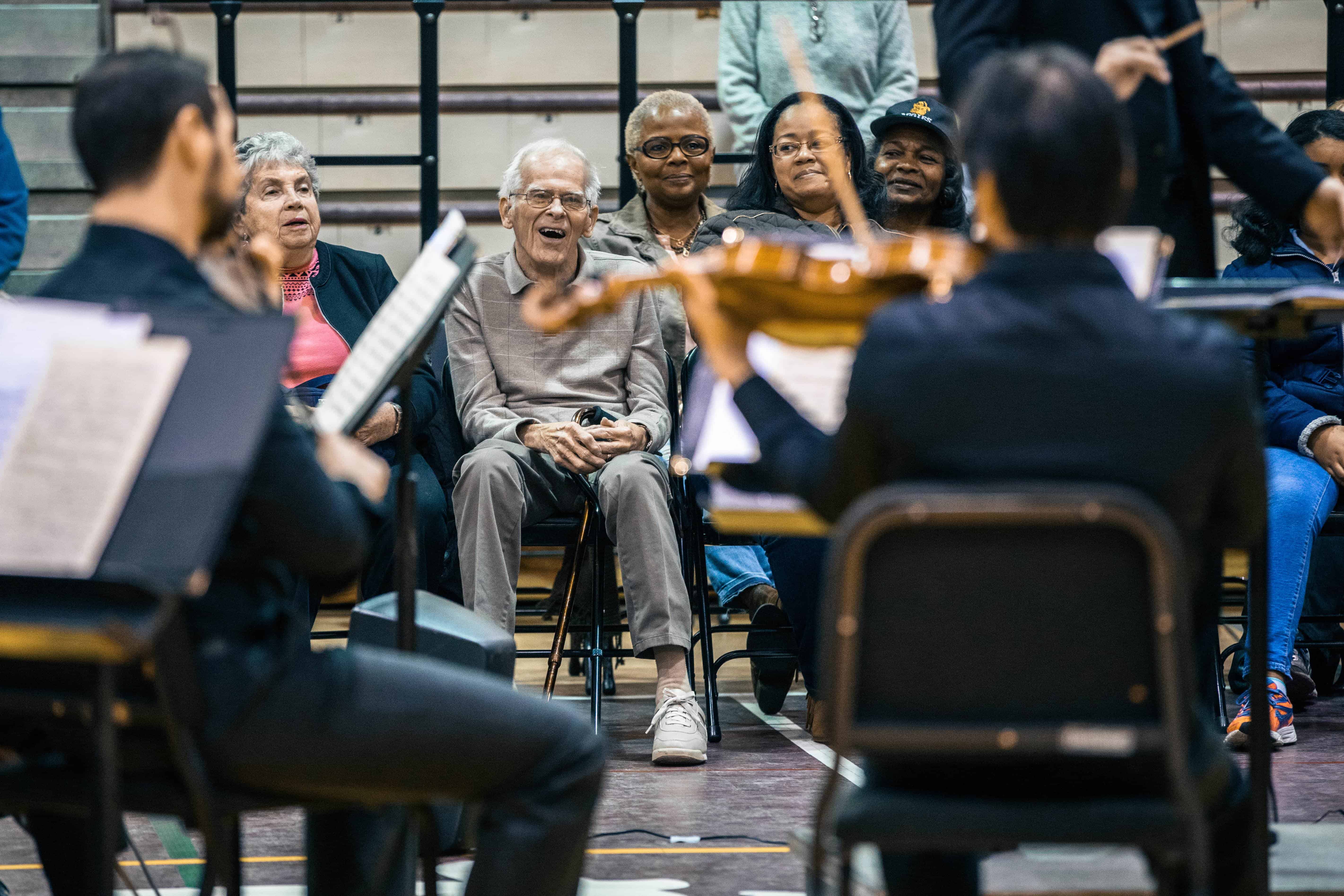 Healing Hands performance
|
Is that important?
Yes! It shows that we value our community. Music should not be a luxury; it should be accessible for everyone.
That's a beautiful idea. Do you think the CSO's community programs are having that effect?
We're really starting to see the long-term successes of programs that we've been doing for a while. I was around for the very beginning, when Project Harmony started at Winterfield Elementary. We've had some success creating a pipeline for students from there to Northwest School of the Arts through to our Youth Orchestras.
 Project Harmony students |
And it's all about providing that pipeline, because down the road, we'd love to see our community reflected onstage. It's difficult because it all comes down to access. If you don't start playing an instrument until middle school you're already at a disadvantage to those that could afford private lessons at an earlier age. The idea is trying to help bridge that gap. |
What's next for education and community engagement at the CSO?
I'd like to see us take the successful programs that we have and expand upon them - deepen their impact. I also want to look at other areas of the community that we haven't reached yet. We're starting to look into sensory friendly concerts. Again, it's about accessibility. Coming uptown at night to sit in an assigned seat for 2 plus hours in a darkened theater can be challenging for patrons with disabilities, but there's no reason why they shouldn't have access to be able to experience the CSO.
| So, what do you do when you're not sharing classical music with the world? I really like singing and acting in community theatre shows, but when you work in the arts, Friday and Saturday nights are when the magic happens, so it's hard to find time for my own performances! I also enjoy sports; I go to a lot of Panthers games. I'm also a proud Appalachian State University grad, so I've been really happy with their success in football. I also really like movies - especially scary ones! Then I have to ask, which horror movie score would you like to hear the CSO perform? Oh, that's tough. I'd have to say Psycho. The score is great - I'd love to hear that played by the CSO! |
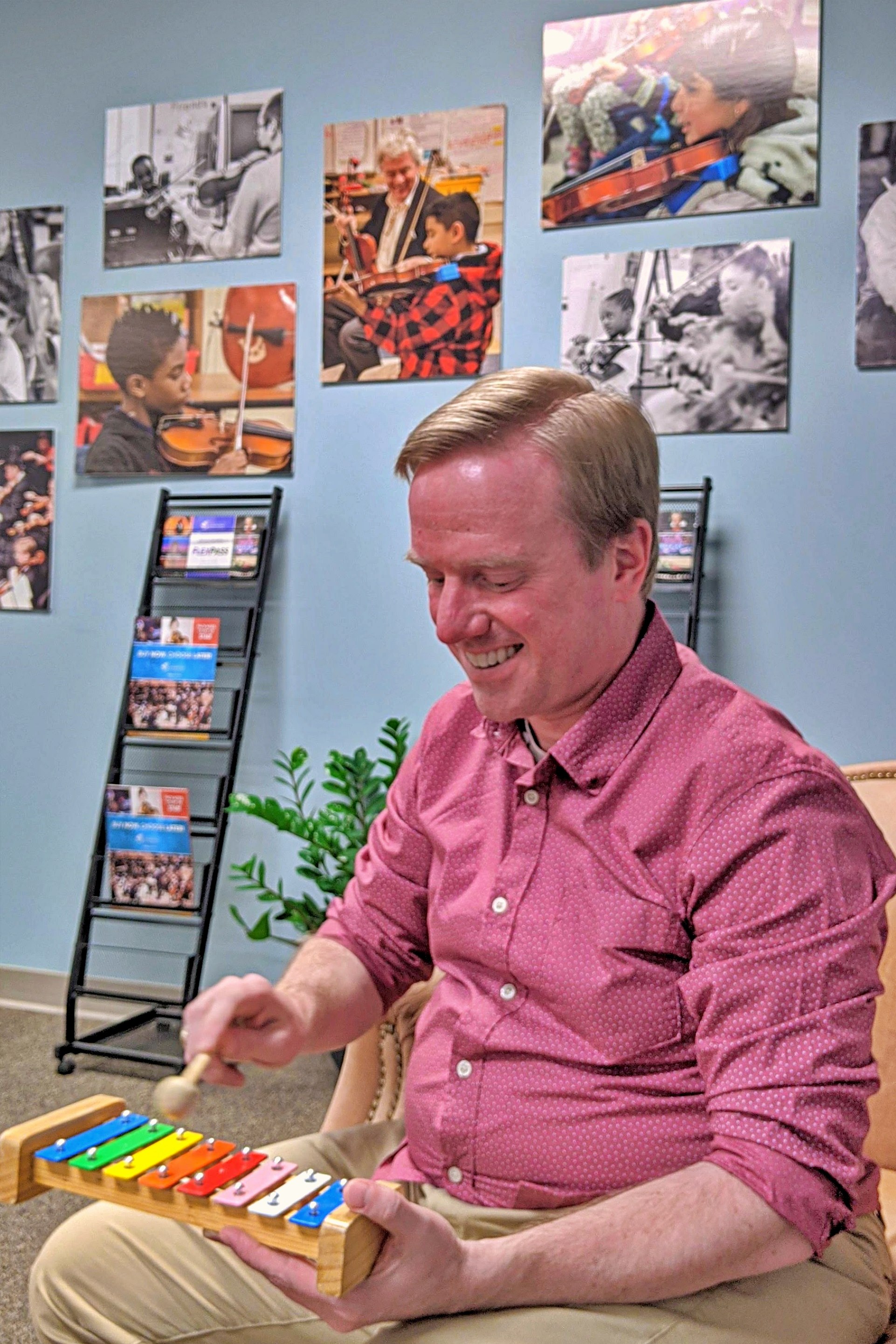 |
Well, we'll have to try to make that happen! Thanks so much for allowing us to get to know you a little better.
Any time. Read more
Meet "Christmastime in Charlotte" composer, Gary Fry
December 5, 2019Emmy-winning composer Gary Fry returns this season for Magic of Christmas & The Singing Christmas Tree, Dec. 13-22 at Knight Theater. We sat down with Gary to find out if his beloved carol written for the Queen City, "Christmastime in Charlotte," will sport a new verse, when he begins listening to Christmas music every year, and more.
 Do you have any holiday traditions?
Do you have any holiday traditions?I think our family traditions are pretty normal. We gather for family dinner on Christmas Eve, and my wife gives all our children (and now, grandchildren) Christmas pajamas before bedtime, and we read the Clement Moore poem "Twas the Night Before Christmas" and the Nativity story from the Gospel of Luke. Christmas Day is a time for spending time with family and opening gifts!
Last year, you wrote a new Christmas carol for us, "Christmastime in Charlotte." Will there be any changes or additions to the carol this year?
From the beginning, the idea was to have one verse of lyrics that changed each year to reflect things that were happening currently in Charlotte, or something special related to the Magic of Christmas program that particular year. You'll just have to come to the concert to find out what the "topical lyrics" are this year!
Which part of the concert are you most excited for?
It's all exciting to me especially the fact that this year joining our wonderful Charlotte Symphony are Carolina Voices' The Singing Christmas Tree, the Charlotte Children's Choir, and Grey Seal Puppets. It will all make for a very fresh and exciting new sound and look - filled with Christmas spirit!
What's your favorite Christmas carol?
Well, I must say I especially like "O Holy Night" as a traditional carol, and the music from the movie The Polar Express is wonderful as far as newer Christmas songs go. And, hearing "Christmastime in Charlotte" is always a wonderful thrill for me as a composer.
If you were a sugar cookie, what shape would you be?
Ha! A Christmas cookie shaped like a harp or a bell-- something musical!-- would be appropriate for me.
A potentially controversial question: At what time of the year do you start listening to Christmas music?
Since I work on so much Christmas music, I listen to it literally year-round. I'm already listening to Christmas music for 2020!
Joyful. Heartwarming. Pure family fun. Make new family memories to cherish for years to come at Magic of Christmas & The Singing Christmas Tree, Dec. 13-22 at Knight Theater. Read more
| Older Posts » |
Latest Posts
- MERGE: Symphonic x Electronic
- Heart of the Home Tour Returns
- Composer Spotlight: Nia Imani Franklin
- More Famous Than Mozart: Joseph Bologne, Chevalier de Saint-Georges
- Art in Motion: Rosalia Torres-Weiner Chosen to Design CSO Roadshow
- Announcing Kwamé Ryan as the Charlotte Symphony’s Next Music Director
- Photos: Charlotte Symphony Annual Gala and Concert
- Five Must-See Concerts of the 2023-24 Season
- 5 Pro Tips for the Best Summer Pops Experience
- A Preschool Performance Three Years in the Making







